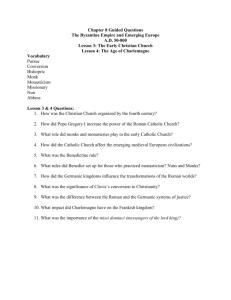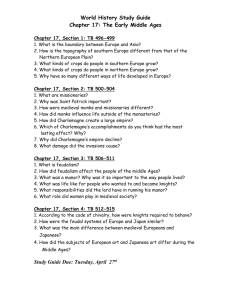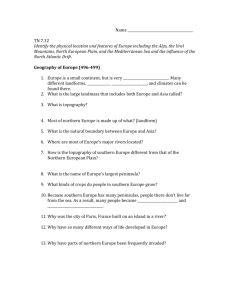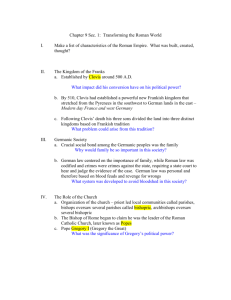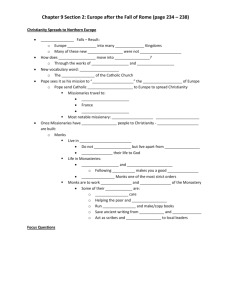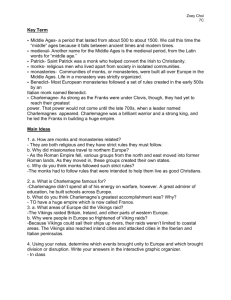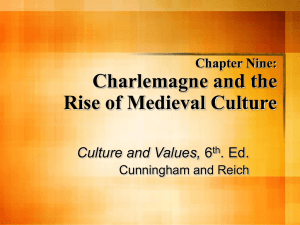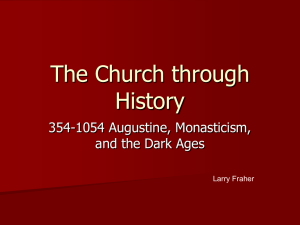FEUDALISM lack of any unifying secular
advertisement
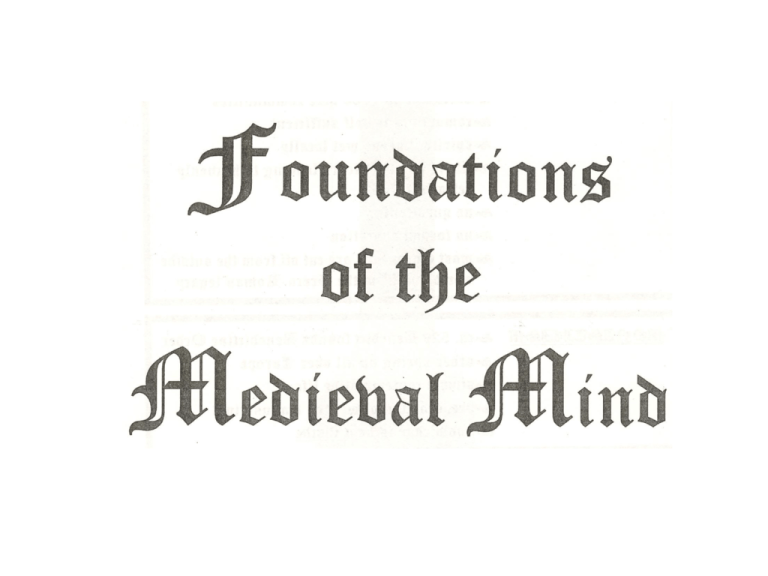
FEUDALISM lack of any unifying secular authority
constant threat of invasion
Europe develops into a fighting society
loyalty and honor are highly valued
MANORIALISM totality of life for most of Europe
serfs tied to 1000 acre communities
community is self sufficient
spiritual needs met locally
life is a vale of tears leading to heavenly
reward
no questioning
no formal education
most Europeans are cut off from the
outside world and from the Greco-Roman
legacy
MONASTICISM ca. 529 Benedict founds Benedictine
Order
order spring up all over Europe
simple contemplative life
preservation of written manuscripts
knowledge is kept inside
Saint Benedict
(480?-547)
Father of Western Monasticism
Early years spent studying in Rome
Shocked by the degenerate life of the city
Withdraws to a cave for three years
Invited to become the abbot of a group of monks living in northern Italy
Monks disagree with his rules and try to poison him
Leaves the group and shortly thereafter and founds a monastery at Monte Cassino
Benedictine Rule:
Stressed communal living and physical labor
Monks not allowed to own property
Communal meals
Unnecessary conversation avoided
Time devoted to the needs of the local people
Distribution of alms and food to the poor
Rule later adopted by most Western monasteries
Franciscans
Itinerant preachers
Extreme poverty
Augustinians
Less rigid
(Martin Luther)
Consolidation of the Church
Early Structure -
power divided among
bishops
variety of interpretations
Theological Unification
Heresies –
Donatist
challenges ability of
certain priests to
administer sacraments
resolution: infallibility
of the office of priest
Arian
challenges the nature of
the Trinity
resolution: Council of
Nicaea
No Dissent Tolerated
Administrative Unification
Primacy of Rome
Peter considered Christ’s spiritual successor
Leo (440-461) – claims ecclesiastical authority
Gregory the Great (590-604) - consolidates authority through diplomacy
Church asserts itself over all secular power – no king is strong enough to challenge its authority
AD 600 – the Church is ready to become the new unifying force in Western Europe
Augustine the Searcher
I. Christian mother
II. Manichean
III. Skeptic
IV. Neo-Platonist
V. Baptized by Ambrose
VI. Bishop of Hippo
Writings:
Confessions
Nature of Reality
Creation from Nothingness
City of God
God is the only reality
GRACE makes God knowable to everyone
Goal – union with God
Platonic Essence of God’s Mind:
Eternal Truths [Pythagoras / Mathematics]
Patterns that acquire physical substance
[Allegory of the Cave]
Time
Time exists for the temporal world
Allows for FREE WILL
Past/Future do not exist for God
God can know outcomes without
influencing them
[Basis for Predestination]
Material World:
•God created the material world, so it must be good
•Platonic view – the material world is impermanent
•focus on the material world diverts us from contemplating God
Conflict:
City of
vs.
City of
has existed since creation
originated with Satan’s revolt
only Hebrews prior to Christ
all Gentiles prior to Christ
after Christ – the Saved
after Christ – the Damned
condemns Greco-Roman heritage
NORSEMEN catalyst-their raids are a major cause of feudalism
conquests have socio-political implications for England,
France, Sicily, and Russia
gloomy view of afterlife
mythology and legends contribute to the Epic tradition in
Western Europe
Carolingian Renaissance
Frankish Kingdom
Charles “The Hammer” Martel defeats Moors at Tours AD 732
Charlemagne {reigned AD 768-814}
drives Moors back into Spain
drives Norsemen back to Denmark
drives Lombards back into Italy
forcibly Christianizes Europe during conquests
crowned Holy Roman Emperor AD 800
Revival
Charlemagne’s capital at Aachen modeled after Ravenna
introduces Roman stone construction to Northern Europe
encourages scholars to come to Aachen
Palatine School – no original scholarship, but sets
precedent as center of learning
Assimilation
Celto-Germanic
{energetic}
Greco-Roman
{rational}
Europe achieves brief unity under Charlemagne
cultures blend with NORTHERN emphasis
Epic Literature
Beowulf – the ultimate Germanic hero
savage deeds not rational philosophy
Le Chanson du Roland –
based on Charlemagne’s nephew and actual battle
feudal / Christian values
